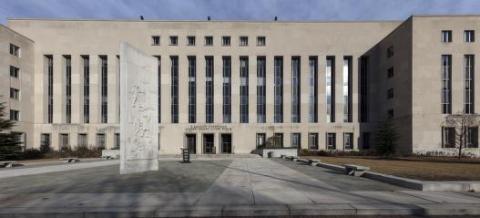Prof. John Greabe on WMUR: Scheme Described in Trump Election Charges Posed ‘Existential Threat to the Constitution'
In an interview on WMUR, Professor John Greabe said the country is again in unprecedented territory after former President Donald J. Trump was indicted this week for conspiring to overturn the 2020 election. (See full interview on WMUR) Trump pleaded not guilty during an arraignment on Aug. 3.
The four-count indictment accuses Trump of conspiring to defraud the United States, conspiring to obstruct an official proceeding, obstructing and attempting to obstruct an official proceeding, and conspiring against the right to vote and to have one’s vote counted.

E. Barrett Prettyman Federal Courthouse where former president Donald Trump was arraigned on Aug. 3.
Photo Credit: Carol M. Highsmith Archive, Library of Congress, Prints and Photographs Division
"If the scheme described in that indictment had succeeded, it really would have posed an existential threat to the Constitution that we have, both the written Constitution that we have, but also the accumulated traditions and norms that are necessarily part of any constitutional order," Greabe said.
“Our Constitution is at the end of the day something more than just words written on pieces of original parchment,” he said. “It depends upon the good faith implementation of constitutional principles by those who hold power under that Constitution.
This week’s federal charges follow two other indictments of the former president since March. Trump has pleaded not guilty to all charges. Among the questions surrounding these indictments: If Trump were to be convicted before the 2024 election and then win the contest, could he pardon himself?
“He can’t pardon himself for convictions under state law but perhaps he could pardon himself for convictions under federal law. That’s something that’s never been tried, never been tested,” he said.
Special counsel Jack Smith urged Americans to read this latest indictment.
"This is clearly an indictment that's written with the idea that the American people are going to read this and need to be able to understand what's going on," Greabe said. "Other indictments often are much more technical, and just sort of based on the statutory language.”